|
|
|
Sort Order |
|
|
|
Items / Page
|
|
|
|
|
|
|
| Srl | Item |
| 1 |
ID:
187426
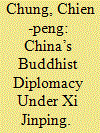

|
|
|
|
|
| Summary/Abstract |
China’s burgeoning economic and security activities abroad have given rise to suspicions and criticisms of its intentions. As Buddhism is a shared faith and heritage among many Chinese; an integral part of national identities of Sri Lanka, Myanmar, Thailand, Laos, and Cambodia; a proud legacy in India; and a major religion in Vietnam, Malaysia, Singapore, Mongolia, Korea, and Japan, winning over the trust and friendship of neighboring Buddhist countries has emerged as an important Chinese diplomatic initiative, especially under the current Xi Jinping leadership’s enterprise to revive the Silk Road. Having over 245 million Buddhists, 28,000 Buddhist monasteries, 16,000 temples, and 240,000 Buddhist monks and nuns makes the promotion of Buddhism a rich source of soft-power, or “soul power,” for China, generated from its heavy investments in building Buddhist institutions and engaging Buddhist groups in these countries. However, there are external and domestic challenges in using Buddhism as a Chinese foreign policy vehicle. The paper analyzes what the objectives of China’s Buddhist diplomacy are; which personnel, organizations, or state bureaus in China make China’s Buddhist diplomacy; how is it carried out; what the targeted institutions and personnel in the affected countries are; the reactions from these countries; and the extent to which a Communist regime is able to carry out its promotion of Buddhism in Asia despite its professed atheism. The analysis is conducted through the spectrum of two major perspectives in international relations literature: neo-realism and constructivism.
|
|
|
|
|
|
|
|
|
|
|
|
|
|
|
|
| 2 |
ID:
187476
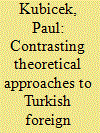

|
|
|
|
|
| Summary/Abstract |
This article introduces a Special Issue dedicated to applying international relations theories to Turkish foreign policy. More specifically, it contrasts structural or neo-realist approaches with ideational or constructivist ones, suggests general strengths and shortcomings in each, and briefly suggests how both might apply to TFP. It also introduces the eight substantive articles in the Special Issue.
|
|
|
|
|
|
|
|
|
|
|
|
|
|
|
|
| 3 |
ID:
068520
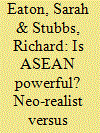

|
|
|
| 4 |
ID:
105424
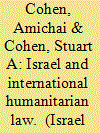

|
|
|
|
|
| Publication |
2011.
|
| Summary/Abstract |
The article argues that throughout her history Israel has evinced sensitivity to international law requirements. Over time, however, changes have occurred in the mindset within which that attitude is framed. Broadly speaking, during the early years of statehood, Israel's expressions of respect for international law articulated an essentially utilitarian attempt to gain legitimacy. More recent pronouncements, by contrast, reflect two other developments, which to some extent interact. One is the growing diffusion of the decision-making process in Israel with regard to national security affairs. The second is the growing influence within Israeli political and public life of several institutions, governmental and non-governmental, whose respect for international law is based on their perception of the intrinsic legitimacy of that corpus.
The article illustrates the impact of those processes, inter alia through an examination of the influence exerted by the IDF's International Law Branch (DABLA), especially with reference to targeted killings.
|
|
|
|
|
|
|
|
|
|
|
|
|
|
|
|
| 5 |
ID:
187483
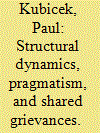

|
|
|
|
|
| Summary/Abstract |
In recent years, closer Turkish-Russian relations have captured the attention of both academics and policymakers, but also seem rather paradoxical as the two countries find themselves on opposite sides of conflicts in Syria, Libya, and the Caucuses. This paper evaluates how effective neo-realist (structural) and ideational (constructivist) theories of international relations are in explaining the Turkish-Russian relationship. Ultimately, this paper finds more merit in accounts grounded in neo-realism that can capture aspects of both cooperation and conflict/competition in the relationship.
|
|
|
|
|
|
|
|
|
|
|
|
|
|
|
|
| 6 |
ID:
061674


|
|
|
|
|
|
|
|